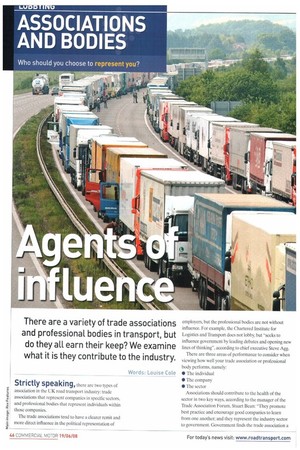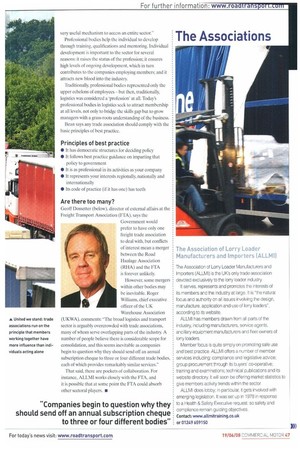There are a variety of trade associations and professional bodies
Page 46

Page 47

If you've noticed an error in this article please click here to report it so we can fix it.
in transport, but do they all, earn their keep? We examine what it is they contribute to the industry.
Words: Louise Cote
employers, but the professional bodies are not without influence. For example, the Chartered Institute for Logistics and Transport does not lobby, but "seeks to influence government by leading debates and opening new lines of thinking", according to chief executive Steve Agg.
There are three areas of performance to consider when viewing how well your trade association or professional body performs, namely: • The individual • The company • The sector Associations should contribute to the health of the sector in two key ways, according to the manager of the Trade Association Forum, Stuart Bean: "They promote best practice and encourage good companies to learn from one another; and they represent the industry sector to government. Government finds the trade association a very useful mechanism to access an entire sector."
Professional bodies help the individual to develop through training, qualifications and mentoring. Individual development is important to the sector for several reasons: it raises the status of the profession; it ensures high levels of ongoing development, which in turn contributes to the companies employing members; and it attracts new blood into the industry.
Traditionally, professional bodies represented only the upper echelons of employees — but then, traditionally, logistics was considered a 'profession' at all. Today's professional bodies in logistics seek to attract membership at all levels, not only to bridge the skills gap but to grow managers with a grass-roots understanding of the business.
Bean says any trade association should comply with the basic principles of best practice.
Principles of best practice
• It has democratic structures for deciding policy • It follows best practice guidance on imparting that policy to government • It is as professional in its activities as your company • It represents your interests regionally, nationally and internationally • Its code of practice (if it has one) has teeth The Association of Lorry Loader Manufacturers and Importers (ALLMI) is the UK's only trade association devoted exclusively to the lorry loader Industry.
It serves, represents and promotes the interests of its members and the industry at large. It is "the natural focus and authority on all issues involving the design, manufacture, application and use of lorry loaders", according to its website.
ALLMI has members drawn from all parts of the industry, including manufacturers, service agents, ancillary equipment manufacturers and fleet owners of lorry loaders.
Member focus is quite simply on promoting safe use and best practice. ALLMI offers a number of member services including: compliance and legislative advice; group procurement through its buyers co-operative; training and examinations; technical publications and its website directory. It will soon be offering market statistics to give members activity trends within the sector,
ALLMI does lobby; in particular, it gets involved with emerging legislator. It was set up in 1978 in response to a Health & Safety Executive request, so safety and compliance remain guiding objectives.
Contact: www.attmitraining.co.uk or 01249 659150
















































































































































































































